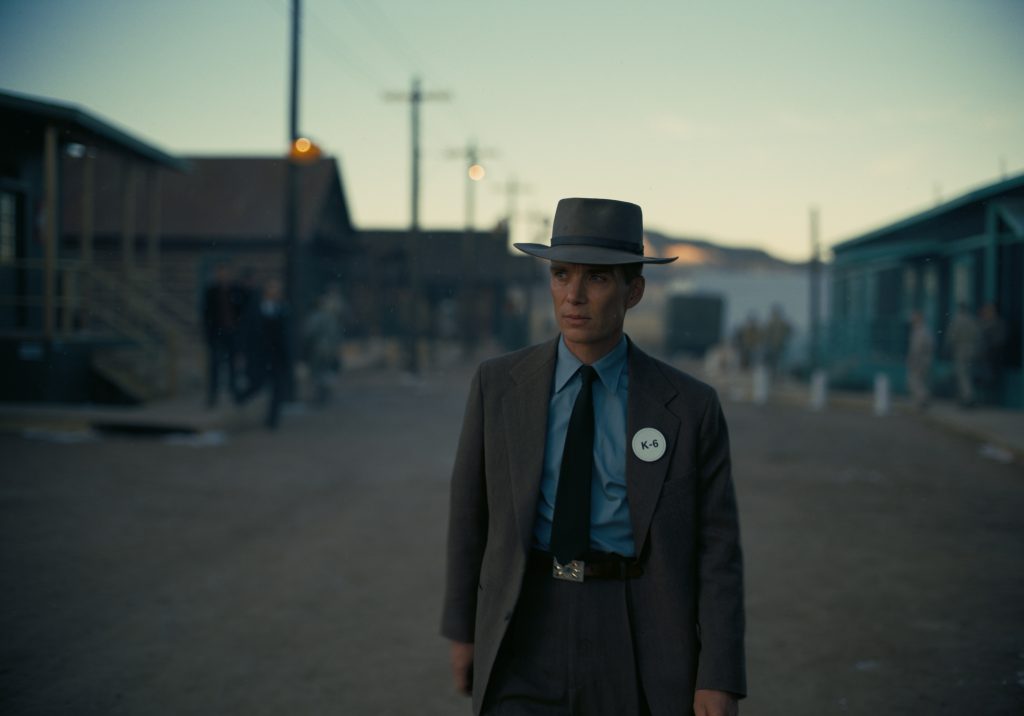We all want to leave our mark on this world. Something good that contributes to the progress of society. For most of us, any impact we make will likely be small, whether it’s a good deed here or there or just doing our part in making the world a slightly better place to live. Physicist J. Robert Oppenheimer would make one of the greatest impacts on the world and change all of humanity in the process as the “father of the atomic bomb.” Christopher Nolan’s Oppenheimer explores the complicated nature and tormented anguish of bearing that responsibility. Not only does everyone involved deliver the best of their talents, but the film’s story is a haunting reminder of humanity’s lust for power and fear of those who have it. Oppenheimer is Nolan’s magnum opus and a triumph of science and destruction.
Talking place throughout various points in Oppenheimer’s life, Oppenheimer follows the rise of the theoretical physicist as he dives into unexplored theories across science. His research in the field leads to him being recruited by the government to build a “device” that could put an end to World War II, a bomb bigger than anything that has been seen before in existence. Under the strictest security, Oppenheimer builds an entire community of scientists to do the impossible as they race against both the Germans and the Russians to get there first. Meanwhile, there are also glimpses of the resulting fallout from the creation of the atomic bomb, and Oppenheimer’s security clearance is looked at when his own ties to communism come into question as he deals with carrying the burden of feeling responsible for the bombings in Japan.
Oppenheimer is a 3-hour biographical drama on the creation of the first atomic bomb. It’s pretty much all science and mathematics and no action. And yet Nolan has you on the edge of your seat for nearly the entire time thanks to his tightly written script, superb acting, and tense score. As I mentioned earlier, we all have a desire to impact this world in one way or another. Everyone knows the impact the creation of the atomic bomb had on society. It’s that knowledge of knowing exactly where everything is leading to that helps build the tension. Oppenheimer has a belief that the work he is doing is for the good of the world. He believes that it’s better for the United States to have this technology first and that it falling into the hands of Germany would be a much worse outcome. That is why he continues to push forward despite the horrific levels of destruction the science is telling him. He believes in science, but he puts his faith in society. He hopes that sole creation of an atomic bomb would be enough to put an end to the war and that it wouldn’t have to actually be put to use. We all know how that turned out.

J. Robert Oppenheimer’s trust in society is misguided. Once the bomb is out of the bag, there is no putting it back in. The science and math showed that there was a near zero chance the bomb would ignite the atmosphere and essentially blow up the entire world. Yet they still moved forward. Those odds match how Oppenheimer believed the world would react to its creation. Deep down he knew there was a miniscule chance that the world would see the destructive potential of the bomb and that it would lead to peace, without it having to be actually used. He knew exactly what the United States would do with it once it was finished, though.
The stress and torment placed upon Oppenheimer is played perfectly by Cillian Murphy, his gaunt and thin frame weighed down by ramifications of his life’s work. Nolan captures every minute detail in Murphy’s performance, best seen on either IMAX or 70mm or both in the theater. Every wrinkle, every twitch, every strain is captured is glorious detail. The camera provides a window into the soul of the characters to a point where you can see the cogs turning in their heads, adding deeper levels to the dialogue. You feel the tension and exhaustion placed on Oppenheimer’s shoulders as he races against the Germans to complete the bomb first. The bomb itself is only the fuse for the film, setting off a chain reaction of thoughts and emotions made all the more powerful by the hindsight of today.
Christopher Nolan does an amazing job at building the tension throughout the course of the film. Every character is committed to a purpose and while Cillian Murphy is always front and center, the phenomenal supporting cast are always there to remind audiences just how high the stakes are. Like Apollo 13, Oppenheimer builds suspense through science and math. Quantum physics is hard to explain, but the film does an excellent job at dumbing it down enough for it to make sense. A glass bowl filled with marbles represents the amount of uranium needed for the bomb. Every so often we see a handful of marbles get added to the bowl as it gets closer and closer to being filled as the science continues to march on towards the inevitable. Ludwig Göransson’s amazing score adds so much to the film’s dialogue, turning fairly normal conversations into mini tension-filled warheads that could explode at any moment. The film does lose some momentum after the test explosion occurs as there is still a good portion of the film left, but things never become boring.
Oppenheimer is a double-edged blade. On one hand, it’s a triumph of human intellect, a celebration of what man can achieve through science and math all working together. On the other hand, it also represents the horrors we are capable of. Christopher Nolan brilliantly captures that complexity on screen. J. Robert Oppenheimer’s impact, along with all those involved in the Manhattan Project, continues to ripple through to this day. It’s a haunting and stark reminder of the power we hold in our hands. Nuclear weapons are forever here to stay, and we must all deal with the fallout.
-
Oppenheimer
Summary
Christopher Nolan’s Oppenheimer explores the complicated nature and tormented anguish of bearing that responsibility. Not only does everyone involved deliver the best of their talents, but the film’s story is a haunting reminder of humanity’s lust for power and fear of those who have it. Oppenheimer is Nolan’s magnum opus and a triumph of science and destruction.







